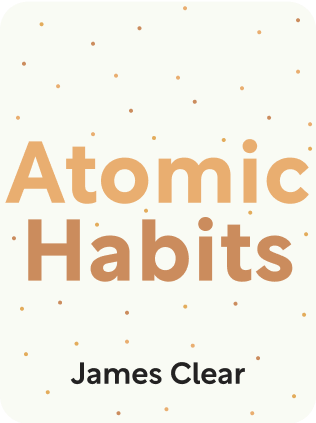

This article is an excerpt from the Shortform book guide to "Atomic Habits" by James Clear. Shortform has the world's best summaries and analyses of books you should be reading.
Like this article? Sign up for a free trial here .
What are the atomic habits? How can you turn tiny habits into big changes over time?
People often try to change their habits by attempting to introduce a completely new behavior without prior build-up. But according to Robin Sharma, new habits are internalized when you practice small, relatively effortless behaviors consistently. He calls these types of habits the atomic habits.
Keep reading to learn more about the atomic habits.
What Are the Atomic Habits?
When you start applying the atomic habits concept, don’t expect to see immediate results. You must give them time to compound into the notable life changes you want to see.
It’s easy to become frustrated if you look at the immediate results of a new habit as a measure of success. When you’re frustrated, it’s easier to give up or revert back to what’s comfortable or familiar.
If you accept that time is required for any small change to reach an effectual point, you will not only be able to see the compound effect but also have formed a lasting positive habit that can lead to more improvement and happiness in the future.
For instance, if you want to save money for a vacation to Hawaii, saving a dollar a day may be the habit you initiate. However, after a week, an increase of $7 saved will seem insignificant, the goal will seem too big, and your efforts will feel futile. At that point, you give up. But after a year of saving a dollar a day, your savings account grows to $365, then $730 after two years, plus all the interest you’ve earned over the two years. You can now afford your trip and have also created a lasting system that will help you continue to save money.
Time becomes a measure of your habits. With good habits, time works to support your actions and helps you become the person you want to be. With bad habits, time works against you by keeping you on a bad life trajectory. Let’s look at some examples of the atomic habits that compound positively, and then some that compound negatively.
Positive Habits
Productivity—Adding one extra task to your day can lead to big changes in your productivity. As the task is continually performed, it becomes a habit, and habits become automatic. Automatic habits require little thought, thereby opening up mental space to consider new tasks or behaviors and increasing your daily productivity.
- Deciding to make the next day’s to-do list before going to bed might be a small change in your normal routine. But adding this small task to the previous day helps you start your day already organized and clears up time and mental space for something else in the morning.
Knowledge—Learning one new piece of information one day will not make you a more-informed person overall, at least not in an obvious way. But deciding to learn one new thing each day will build up over time into a wealth of knowledge. Not only are you broadening your scope of knowledge, but new information blends with old information to provide greater insight, thereby continuing to enhance your knowledge base.
- You want to learn more about investing. If you read one article, you’ll learn more about one small aspect. But if you learn one new piece of knowledge regarding stocks and market prices a day, those pieces will compound into a larger understanding of how investments work. With this knowledge, you’ll have a better grasp how other factors relate to the overall economic system, such as retirement accounts, real estate, and international relations.
Relationships—Getting to know one new person will not change your social landscape dramatically. But if you make a point of getting to know one new person each week, you will slowly build a network of new friends and connections.
- If you decide to become better acquainted with one co-worker each week, after a year, you’ll have amassed a network of business connections.
Negative Habits
Stress—One moment of stress every now and then is common and harmless. But if you remain in a continued state of stress, it will compound over time and have a negative impact on your overall health. Also, as you dwell in this negative state, your overall outlook on life will shift until multiple aspects of your day become stress-inducing.
- If you leave the house late each morning, rush hour traffic becomes that much more stressful as you panic about getting to work on time. Starting each day with this frustration sets you on a negative trajectory from the beginning. From there, other little grievances will begin to frustrate you, and after a while, your entire day is one long frustration. This type of compounded stress five days a week for a whole year can equate to reduced mental and physical health and have lasting consequences.
Self-Esteem—Feeling low or bad about yourself one day won’t change your general opinion about who you are. But frequent thoughts about your lack of worth can build to a point of self-recrimination and poor self-esteem, which can stifle future self-improvement attempts.
- If you do poorly on a test, you may feel bad about not taking more time to study properly. Over time, if your study habits don’t change, your continual poor grades will make you feel unintelligent or lacking in the skills required to perform at a high level, which will bleed into other aspects of life.
Outrage—One moment of agitation won’t lead you down a path of constant discontent or rage. But if you fail to find better ways of dealing with anger, you will continue to spiral into a volatile state in which any disturbance sends you over the edge.
- Feeling outraged when you experience discrimination is a natural reaction. But if you allow that outrage to sully your perspective on life or expectations for how you will be treated, your outrage can build to a point where you are quick to argue or, worse, engage in violence.
The Atomic Habits: The Key to Reaching Your Full Potential
When you understand how the atomic habits work and stay committed to change, you can achieve your full potential. A breakthrough moment is when that potential is reached and your goal achieved. From the outside, this breakthrough may seem like an “overnight success.” But your success did not happen overnight. Breakthroughs are only possible if you make it through the valley of disappointment and push through the plateau of latent potential.
The valley of disappointment is the space between what you expect to happen when you change a habit and what actually happens. Prevailing wisdom deems that progress should be linear—one thing happens that builds to another and another until you reach the top. Therefore, you expect the trajectory of success to move in a straight line at a steady incline.
However, because time is required for atomic habits to have an effect, there will be a period at the beginning where the line of progress moves horizontally. This horizontal movement is the plateau of latent potential. Disappointment occurs in the gap, or valley, created between the assumed trajectory and the realistic plateau because you haven’t seen any signs of improvement yet. But if a small behavior change is successfully continued, the plateau will eventually curve sharply up and continue to ascend.
All the benefits of your hard work to change your behavior wait on the other side of the plateau of latent potential. Atomic habits are seeds that must first be planted for the tree to grow, but the tree will not begin to sprout immediately after being planted. Each day that you continue the new habit and improve by 1% is like adding water to the seed, which nurtures the roots and allows them to embed into the earth. There must be a foundation created underground before the sapling can burst through to the outside.
The period in which you are on the plateau of latent potential is similar to the time needed for the roots to create that foundation. You must stick with a new behavior long enough to get past the plateau and begin your ascent upward.

———End of Preview———
Like what you just read? Read the rest of the world's best book summary and analysis of James Clear's "Atomic Habits" at Shortform .
Here's what you'll find in our full Atomic Habits summary :
- The 4 Stages of Habit Formation you can use to transform your life
- How more than half of your daily actions are automatic
- Why some habits stick and why others won't






